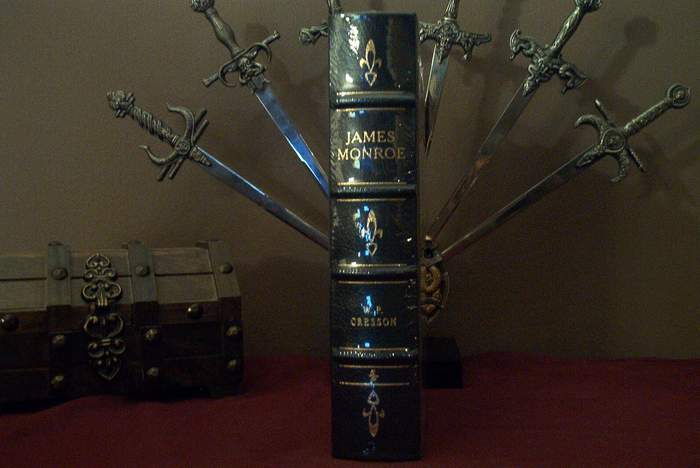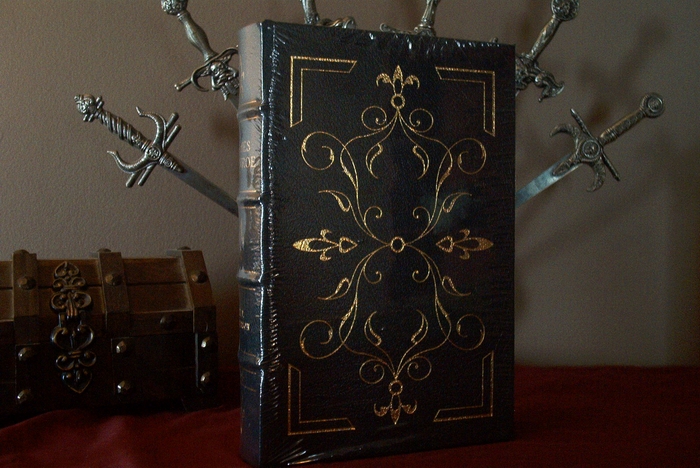Easton Press James Monroe books
James Monroe - William P. Cresson - 1986President James Monroe biography
In 1782, at the age of twenty four, James Monroe was elected to a seat in the Virginia legislature and became a member of the Virginia Executive Council. His next legislature service was in the Congress of the Confederation, in which he served from 1783 to 1786, contending vigorously for the right of Congress to regulate commerce, for the right of free navigation of the Mississippi by the United States, and for other measures designed to promote the development of the West. Upon his retirement from Congress in 1786 he was again chosen to a seat in the Virginia legislature and in 1788 became a member of the State convention called to ratify the Federal Constitution. James Monroe supported Patrick Henry in his futile opposition to the Constitution, making several lengthy arguments against ratification.
In 1790 James Monroe was elected to the Unites States Senate, in which he served until 1794, acting with the Anti-Federalists and opposing vigorously the administration of President George Washington. James Monroe was nevertheless appointed minister to France largely because of his friendly attitude toward France and the desire of the President to offset the appointment of John Jay, a stanch Federalist, as minister to England. James Monroe's conduct of diplomatic relations, however, particularly his public disapproval concerning the treaty which John Jay was at the time negotiating with England, did not meet with approval of the administration, and he was accordingly recalled in 1796.
After a three year retirement from public service, James Monroe became governor of Virginia, serving until 1802. The accession of Jefferson to the Presidency in 1801 insured James Monroe's return to national politics, and in the following year he was again sent to France as an additional plenipotentiary to aid Robert R. Livingston in the negotiations already begun for the purchase of New Orleans, and at the same time to assist Charles C. Pinckey in negotiations with Spain for the purchase of the Floridas. After the conclusion of the treaty by which France sold Louisiana to the United States in 1803, James Monroe was sent as minister to England and subsequently to Spain. A treaty was finally concluded with England, but, not being satisfactory to the President on the question of impressment and indemnity, it was never laid before the Senate. The negotiations with Spain for the cession of the Floridas were likewise unsuccessful.
In 1807 James Monroe returned to the United States, and again served in the Virginia Assembly. In 1811 he was for a second time chosen as Governor of Virginia, but held the office only for a short time, before being called to the cabinet of President James Madison as secretary of state in the same year. He held this office until 1817, and for a time in 1814 and 1815 also acted as secretary of war. In 1816, while in his fifty ninth year, James Monroe was elected President of the United States, having received 183 electoral votes, against 34 cast for the Federalist candidate, Rufus King. Four years later he was re-elected, receiving every vote in the Electoral College except one. The principal events of President James Monroe's administration were the Seminole War, the acquisition of Florida, the Missouri Compromise, and the clarification of United States relations with Europe in regard to South American affairs, which resulted in the annunciation of the permanent policy of the government known as the Monroe Doctrine. The period was known as the "Era of Good Feeling", because of the general prosperity of the country and the absence of party strife. Vast internal improvements were undertaken, and the westward movement of the population was marked. Five new States Mississippi, Illinois, Alabama, Missouri, and Maine were admitted to the Union.
At the close of President James Monroe's second term in 1825 President James Monroe retired to private life, residing in Virginia and in New York, where he died. During the year preceding his death he served as a member of the Virginia Constitutional Convention.
James Monroe by William P. Cresson
James Monroe offers readers a comprehensive exploration of the life and legacy of the fifth President of the United States. Born on April 28, 1758, in Westmoreland County, Virginia, James Monroe emerged as a central figure in American politics during the nation's formative years. Cresson's biography provides a detailed examination of Monroe's early life, including his service in the Continental Army during the American Revolution and his subsequent career in law and public service. Monroe's contributions to the founding of the United States are illuminated, particularly his role as a delegate to the Continental Congress and his involvement in the drafting of the Virginia Constitution.As President from 1817 to 1825, Monroe presided over a period of relative peace and prosperity known as the "Era of Good Feelings." Cresson's narrative explores Monroe's presidency, including his efforts to expand the nation's territory through the acquisition of Florida and his establishment of the Monroe Doctrine, which declared American opposition to European interference in the Western Hemisphere.
Cresson delves into Monroe's personal life as well, offering insights into his relationships with family, friends, and political allies. Through meticulous research and engaging prose, Cresson paints a vivid portrait of Monroe as a statesman, diplomat, and visionary leader who played a pivotal role in shaping the course of American history. James Monroe is a definitive biography that offers readers a deeper understanding of the man behind the presidency and his enduring impact on the United States. Cresson's narrative is both informative and insightful, making this book essential reading for anyone interested in the life and times of James Monroe.
James Monroe quotes
"National honor is the national property of the highest value."
"The best form of government is that which is most likely to prevent the greatest sum of evil."
"It is only when the people become ignorant and corrupt, when they degenerate into a populace, that they are incapable of exercising the sovereignty. Usurpation is then an easy attainment, and an usurper soon found. The people themselves become the willing instruments of their own debasement and ruin."
"The right of self-defense never ceases. It is among the most sacred, and alike necessary to nations and to individuals."
"The American continents, by the free and independent condition which they have assumed and maintain, are henceforth not to be considered as subjects for future colonization by any European powers."
"The best way to preserve the confidence of the people durably is to promote their true interest."
"We must support our rights or lose our character, and with it, perhaps, our liberties. A people who fail to do it can scarcely be said to hold a place among independent nations."
"The happiness of the domestic fireside is the first boon of Heaven; and it is well it is so, since it is that which is the lot of the mass of mankind."


Comments
Post a Comment
Share your best book review and recommendation